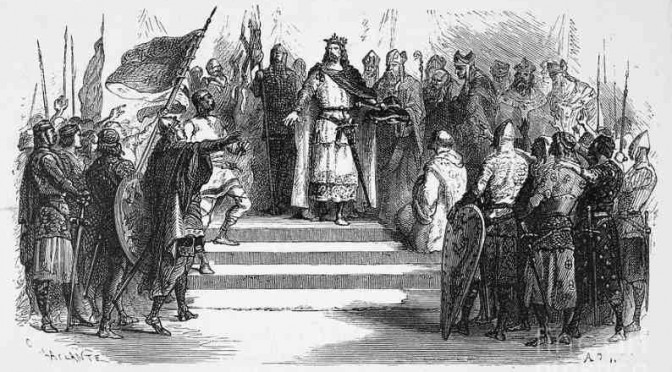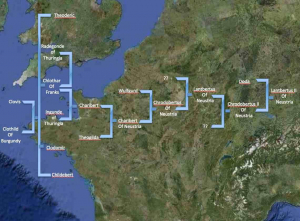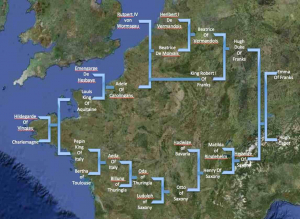 In 987, Hugh Of Vermandois, known by his nickname of Hugh Capet, put together a carefully prepared case to support his claim to the French throne.
In 987, Hugh Of Vermandois, known by his nickname of Hugh Capet, put together a carefully prepared case to support his claim to the French throne.
Though Hugh Capet was descended from Charlemagne on both sides of his family both lineages were dependant on female ancestors.
He already possessed the power of a king, as he was able to dominate the last of the Carolingian kings. His father had been the Duke of l’Ile de France, the area around Paris, roughly bounded by the rivers Seine, Marne, Oise and Beuvronne.His family held much of the land within l’Isle but little beyond it’s boundaries.
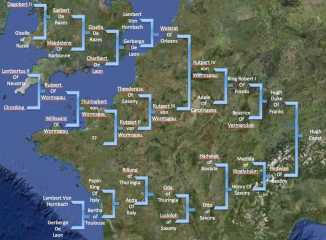 He was able to show showed that on both sides of his family he acquired the Dagobert blood line. The church, in the same period, suddenly changed its attitude to Dagobert.
He was able to show showed that on both sides of his family he acquired the Dagobert blood line. The church, in the same period, suddenly changed its attitude to Dagobert.
Having attempted for over two hundred years to write Dagobert out of history the Catholic Church eventually relented and made him a saint of the Roman church! Interestingly, New Advent, the catholic encyclopedia, which is normally fulsome on the subject of saints, has no entry for St Dagobert.
Hugh Capet’s link to the Dagobert line was however once again dependent on female links. he quite possibly only used this as a supporting argument as if he had depended on it too strongly, it could have led to someone who had an even better claim than his own. The descendant dIrect patrilineal descent of the Dagobert line in 987 was Jean I de Joinville.
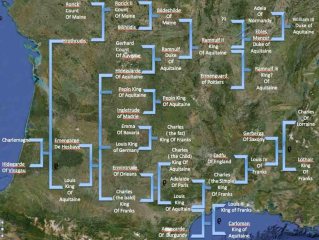 The Later Carolingians. Charles The Fat was replaced by Eudes, Charles the simple was replaced by Robert.On the death of Lothair and his son Louis V there was an obvious hereditary claimant, Charles of Lorraine. Archbishop Adalberon of Reims, however who had also be chancellor to Lothair and Louis called a meeting which he deemed to be an electoral assembly.
The Later Carolingians. Charles The Fat was replaced by Eudes, Charles the simple was replaced by Robert.On the death of Lothair and his son Louis V there was an obvious hereditary claimant, Charles of Lorraine. Archbishop Adalberon of Reims, however who had also be chancellor to Lothair and Louis called a meeting which he deemed to be an electoral assembly.
An extract of his speech to the assembly reads “Crown the Duke. He is most illustrious by his exploits, his nobility, his forces. The throne is not acquired by hereditary right; no one should be raised to it unless distinguished not only for nobility of birth, but for the goodness of his soul.”
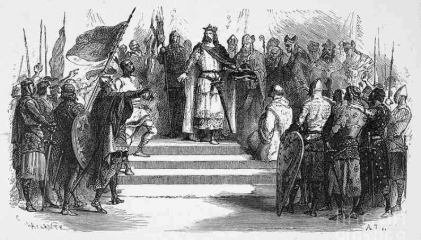 It would have been a complete surprise to those attending the meeting to hear that the role of King of the Franks was not hereditary but an elected position. The King of the Franks had been hereditary since the death of Clovis though the position was often bitterly contested by various members of the royal family.
It would have been a complete surprise to those attending the meeting to hear that the role of King of the Franks was not hereditary but an elected position. The King of the Franks had been hereditary since the death of Clovis though the position was often bitterly contested by various members of the royal family.
At the meeting were bishops of the church and the magnates of the Frankish lands (north and west of the river Loire. One of the bishops was a future Pope and it is almost certain that both popes John XIV and XV would have been involved in the preparation for the meeting.
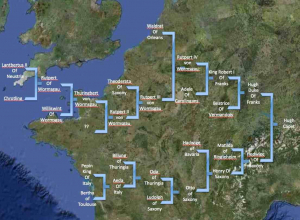 Hugh Capet introduced new information to show he had a much stronger case than the links to the Carolingans and the Dagobert. Through the counts of Wormsgau there is a direct patrilineal link from Clovis to Hugh Capet! This is at least the equal of the Dagobert line and Hugh Capet believed no one else shared this lineage. He believed this meant that as long as the House of Capet could produce male heirs there could be no challenge to its supremacy!
Hugh Capet introduced new information to show he had a much stronger case than the links to the Carolingans and the Dagobert. Through the counts of Wormsgau there is a direct patrilineal link from Clovis to Hugh Capet! This is at least the equal of the Dagobert line and Hugh Capet believed no one else shared this lineage. He believed this meant that as long as the House of Capet could produce male heirs there could be no challenge to its supremacy!
Thus the concept of right to rule by possession of certain blood lines was confirmed and Clovis was reestablish as the fount of “Holy Blood”.
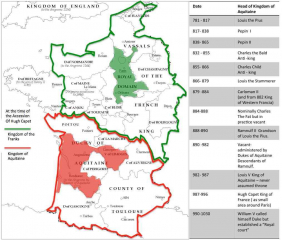 Hugh Capet’s difficulty then became that his temporal possessions did not match his impeccable lineage. He married Adelais Great granddaughter of the Ranulf, King of Aquitaine but failed to make ant substantive change. Aquitaine remained independent and Hugh’s personal possessions were limited to the immediate surroundings of the Ile de France and dependant on the support of the nobles to retain his position.
Hugh Capet’s difficulty then became that his temporal possessions did not match his impeccable lineage. He married Adelais Great granddaughter of the Ranulf, King of Aquitaine but failed to make ant substantive change. Aquitaine remained independent and Hugh’s personal possessions were limited to the immediate surroundings of the Ile de France and dependant on the support of the nobles to retain his position.
